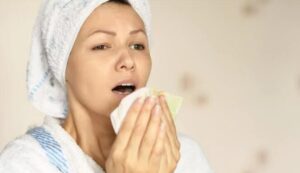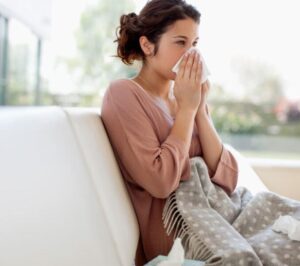Sneezing during the shower is just a regular practice for a lot of people that are followed after sneezing as well. These sneezes are often different and more irregular yet forceful that the common sneezing.
Sneezing after a shower might not harm you but it will definitely annoy you. Here we will see if these sneezes are normal or a form of allergy along with the possible eight reasons that trigger the sneezes.
Lastly, we will provide a way out from sneezing after a shower.
Is It Normal to Sneeze After a Shower?
Sneezing after or during a shower is a symbol that you are having something in your routine that is triggering your allergens and making them active. If you are having some sort of major allergy then you might get followed by other symptoms that are like flu, for example, Coughing, Sore throat, Hives, Red, watery eyes, Runny nose, Itching, Mild headache, Stuffy nose, etc. These can last for a few minutes or can even go for longer depending on the trigger of your allergens.
Recommend reading: The Best Dual Shower Head For Your Bathroom – Newly Updated
Possible Reasons Why Sneeze After or In a Shower?
Here are a few possible reasons why you sneeze after or in a shower as it is not such a common practice for most people. You need to know these causes of sneezing so that you will know what to avoid while taking a shower that will save you from the mess. Let us begin with these eight possible reasons and a way out.
1. Hot Showers
Hot showers are the most relaxing of their kind and have the ability to take away all the tiredness of a day. But they can cause you to sneeze because they suddenly change your body temperature. The temperature rises above the normal point followed by a sneezing reaction specifically for temperature hypersensitive people.
Way Out:
It is suggested to raise your body temperature gradually so that the body fits in with it. Start from a lukewarm water temperature and gradually increase it. Or make some parts of your body warm first rather than getting into the shower all at once.
Recommend reading: Top 8 Best Shower Head with Handheld Combo Reviews & Buying Guides
2. Dust Mites
Dust mites are living tiny bugs found in carpets, mattresses, beddings, upholstery, etc. So, you might be sneezing because of the presence of dust mites that might be present on the rug outside the bathroom or outside the shower cabin. Shower curtains are also a favorite spot for dust mites that feed on dead skin.
Way Out:
Washing is the best way out in this case. Dust mites are not resistant to hot temperatures so you better make them dry at 130 degrees Fahrenheit. This way you will have dust mites’ free shower surroundings and a happy shower.
Recommend reading: The Best Delta Gold Shower Head Reviews
3. Cold Showers:
The issue with cold showers is the same as that of hot showers. Although, taking a cold shower is often rare until you are sweating on a hot summer’s day. A sudden switch of body temperature for a hypersensitive person will cause the body to react by sneezing.
Way Out:
It is better to go for a lukewarm shower instead and if needed the most then decrease the temperature slowly.
Recommend reading: 15 Different Types of Shower Heads
4. Use of Bleach Products in Shower:
Most people avoid using bleach directly during the shower but the shower might be cleaned with bleach products be it in smaller amounts. But bleach fumes and bleach odor last longer that can lead you to sneeze during or after the shower.
Way Out:
Make sure to ventilate your shower area after using bleach by opening doors, and windows, and venting the fan. Rinse it well to take off any excess remaining.
Recommend reading: Why Can’t You Shower After Cupping?
5. Mold Spores:
Mold grows quickly in damp areas and the shower area mostly stays humid that giving way to a sour and musty odor. They can be yellow, black, green, or even white found in the darkest corner. It can be toxic or nontoxic but both will cause an allergic reaction when inhaled.
Way Out:
You can make a cleaning solution by mixing distilled water with vinegar in equal amounts. Spray it on molds and wait for ten minutes. Mold will ultimately fade out which can be followed by a water cleaning process.
Recommend reading: Enjoy the Large Shower Head to Bring the Optimal Shower Experience
6. The fragrance of Shower Products:
The fragrance is the most common element of a shower. Most products used during the shower contains fragrance with different chemical compositions so anyone from soap, shampoo, wax, buttercream, conditioner, etc. can trigger your allergens. This causes a stuffy and itchy nose as the most common symptom of sneezing caused due to fragrance.
Way Out:
Your body care products need to be checked for the ingredients and replaced with hypo-allergic products to avoid sneezing after a shower.
Recommend reading: Top 10 Best Wall Mount Shower Head Reviews
7. High Humidity:
Showers can be highly humid and this humidity can be a reason for mucus production in the nose that leads to sneezing or other allergic symptoms.
Way Out:
You need to lower shower humidity by keeping it ventilated either by opening the window of the bathroom fan or by reducing the time of showering.
8. Chlorine in Shower Water:
Chlorine can give you severe reactions during or after a shower not just by sneezing but by blocking your airways as well. This does not matter if you are allergic to it or not you will react to it in steam or hot water showers.
Way Out:
You can replace the shower with a filter head to avoid chlorine.
Recommend reading: Top 8 Best Detachable Shower Heads Reviews
Conclusion
Sneezing in the shower is not a common practice for many as it might be triggering the allergen that can give you a tough time depending on the severity of the trigger and type of allergy. It can be because of a hot or cold shower that changes body temperature suddenly, bleach odor left from shower cleaning, dust mites in rugs or curtains of the shower cabin, mold spores in damp dark areas, fragranced shower products, high humidity, or chlorine in the water.
Recommend reading: Top 8 Best Adjustable Shower Head Reviews



